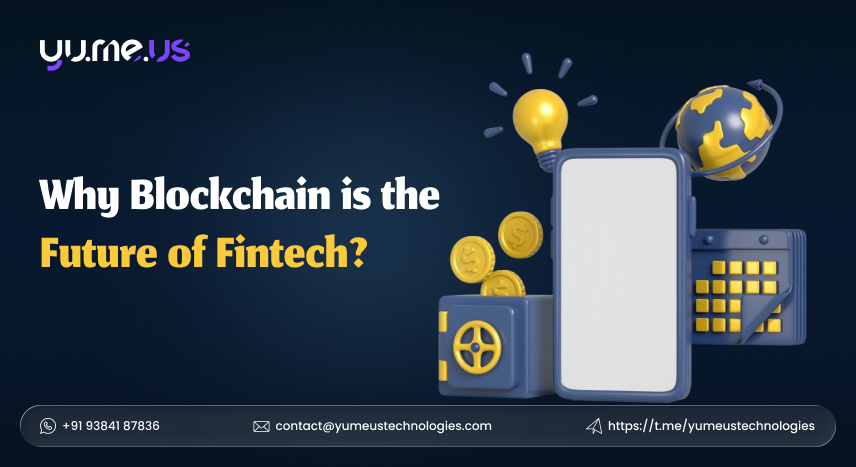Why Blockchain is the Future of Fintech?

<p>Have you ever considered how big the blockchain fintech market really is, not just in numbers today, but what its true potential might be in the next 5 to 10 years? As financial services are already integrating advanced technologies, the global cryptocurrency market alone is projected to reach $45 billion by 2025, while the fintech industry is expected to hit $1.5 trillion by 2030. Would this change how you see the future of finance and where you want to be in it? That is the question that led me to write this blog, Why Blockchain is the Future of Fintech?. Let's get into this.</p><h2><strong>Blockchain - A GameChanger in Fintech?</strong></h2><p>Blockchain's decentralized ledger system is fundamentally adjusting the way fintech operates, removing dependence on traditional intermediaries such as banks. It offers a platform where transactions are secure, tamperproof, and visible to all network participants. </p><p>It has enabled fintech companies to simplify operations, automate complex processes, and build trust. Experts argue that blockchain is the next major leap after the internet, with the potential to automate and digitize financial transactions, making them faster and more productive. </p><h2><strong>Key Statistics & Market Projections</strong></h2><p>The case for blockchain in fintech isn't hypothetical; the data is very real. </p><ul><li><p>In 2024, estimates place the fintech blockchain market size at around USD 4.36 billion by 2025; it's expected to jump to about USD 6.45 billion, with annual growth rates approaching ~45‑50%. </p></li></ul><ul><li><p>Some reports predict this market could reach USD 31‑50+ billion by 2030. </p></li></ul><ul><li><p>A more ambitious forecast sees the global fintech blockchain market exploding from about USD 0.48 trillion in 2024 to approximately USD 21.59 trillion by 2034, at a CAGR of around 46‑47%. </p></li></ul><h2><strong>Tackling Fintech Challenges with Blockchain</strong></h2><p>Fintech is plagued by persistent challenges such as data security, fraud, compliance, outdated infrastructure, and financial inclusion. Blockchain is uniquely positioned to tackle these issues.</p><ul><li><p><strong>Data Security and Privacy:</strong> Blockchain's cryptographic linking of transactions creates a nearly impossible chain to change, significantly reducing the risk of data breaches. </p></li></ul><ul><li><p><strong>Trust and Transparency:</strong> Decentralization confirms that all participants share the same data, building trust and minimizing opportunities for fraud. </p></li></ul><ul><li><p><strong>Financial Inclusion: </strong>Blockchain-based mobile money services allow fintech firms to extend financial services to the underbanked and unbanked populations globally. </p></li></ul><ul><li><p><strong>Regulatory Efficiency:</strong> Automated audit trails and compliance processes support regulatory mandates, reducing business burdens and costs.</p></li></ul><h2><strong>Real-World Applications of Blockchain in Fintech</strong></h2><p>Some major stock exchange groups now use blockchain‑powered platforms for issues, trading, and settlement. Companies like Figure, a blockchain lender, raised hundreds of millions in IPOs, using blockchain to clarify loan issuance and workflow. And,</p><ul><li><p><strong>Digital Payments: </strong>Platforms like Coinbase and PayPal enable secure crypto payments, cross-border transactions, and settlements with reduced costs and times. </p></li></ul><ul><li><p><strong>Smart Contracts:</strong> Decentralized finance applications automate trading, lending, and asset management without intermediaries, using smart contracts that execute instantly when conditions are met. </p></li></ul><ul><li><p><strong>Digital Identity Management: </strong>Blockchain-based identity solutions give users control and security over their information. </p></li></ul><ul><li><p><strong>Asset Tokenization:</strong> Fintech companies tokenize real estate, art, and securities, increasing liquidity and access to traditionally illiquid markets. </p></li></ul><ul><li><p><strong>Cross-border payments:</strong> Blockchain eliminates costly, slow intermediaries, enabling P2P global transfers in seconds rather than days, at a fraction of the traditional cost. </p></li></ul><h2><strong>Key Benefits of Using Blockchain in Fintech</strong></h2><p>Businesses that use blockchain can get ahead by cutting costs, creating new ways to earn, and reaching global markets more easily. Those who ignore it risk falling behind as fintech companies and other competitors move forward with these technologies. The benefits are,</p><ul><li><p><strong>Security:</strong> Advanced cryptography confirms transactions are tamper-resistant, protecting consumers and institutions from fraud. </p></li></ul><ul><li><p><strong>Cost Reduction: </strong>Removing intermediaries cuts transaction and operational costs. For remittances, blockchain solutions can reduce up to 80% of additional costs. </p></li></ul><ul><li><p><strong>Speed:</strong> Settlement times are now measured in seconds, compared to days in traditional finance. By 2032, real-time payments' growth rate could reach 33% annually. </p></li></ul><ul><li><p><strong>Traceability: </strong>Every transaction is permanently recorded. This improves compliance, fraud detection, and simplifies the tracking of assets. </p></li></ul><ul><li><p><strong>Inclusive Finance: </strong>Lower fees and simplified access promote inclusion for unbanked populations.</p></li></ul><h2><strong>Business Opportunities from Blockchain in Fintech</strong></h2><p>For startups, enterprises, and investors, blockchain is an engine for entirely new business models. Let me mention some of the profitable and promising opportunities that are,</p><h3><strong>Decentralized Exchanges </strong></h3><p>Companies like Uniswap allow instant, peer-to-peer asset trading without middlemen. With the company of a crypto exchange development company, entrepreneurs can build a decentralized exchange.</p><h3><strong>Cross-Border Payments & Remittances</strong></h3><p>With transaction fees often exceeding 7% for international remittances, blockchain-based solutions can slash costs to under 2%, creating room for profitable fintech products.</p><h3><strong>Asset Tokenization Startups</strong></h3><p>By 2030, experts estimate that tokenized assets could represent USD 16 trillion globally. Businesses can build platforms for fractional ownership of real estate, stocks, collectibles, or commodities.</p><h3><strong>Compliance as a Service (CaaS)</strong></h3><p>With increasing regulatory scrutiny, fintech's offering of blockchain-based KYC/AML verification services stands to catch the demand for reg-tech solutions.</p><h3><strong>Stablecoins & CBDC Integration</strong></h3><p>As central banks issue digital currencies, businesses that create <a target="_blank" rel="noopener noreferrer nofollow" class="text-indigo-600 hover:text-indigo-800 underline" href="https://www.yumeustechnologies.com/white-label-crypto-payment-gateway">crypto payment gateway</a>, wallets, and APIs for CBDC transactions will become pioneers.</p><h2><strong>The Future of Blockchain in the Financial World</strong></h2><p>The future of blockchain in finance looks bright. Tomorrow's fintech will run on DeFi platforms that give everyone, everywhere, equal access to money. Worldwide interoperability, B2B disruption, tokenized assets, and compliance hold a strong thing in this sector. Yes, challenges exist, but blockchain is set to revolutionize money into a truly borderless, inclusive system. </p><h2><strong>Final Thoughts</strong></h2><p>Blockchain is becoming the backbone of the finance industry. From payments, identity, smart contracts, and asset tokenization, to DeFi, laws, and cross‑border finance, it delivers value in speed, cost savings, and security. <br> <br>According to statistics, there is a nearly a hundred percent CAGR in many forecasts, with market values rising from billions into the trillions within a decade. The use cases show us who's moving first. So here's a question to leave you with: Are you building for the blockchain future or will you have to play catch‑up?</p><p></p>


